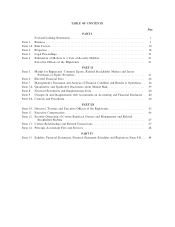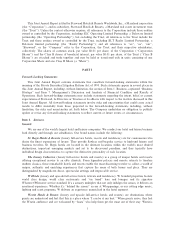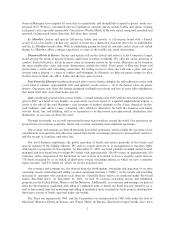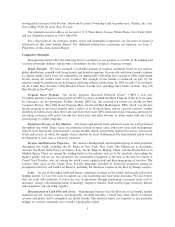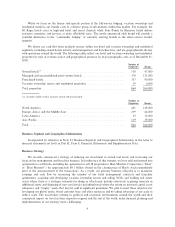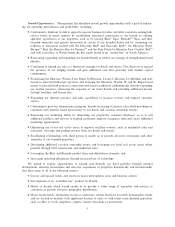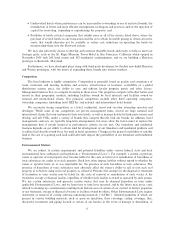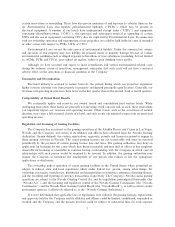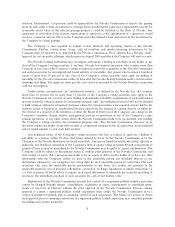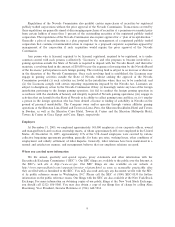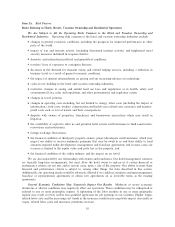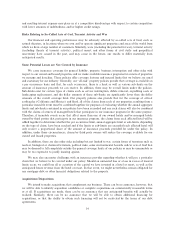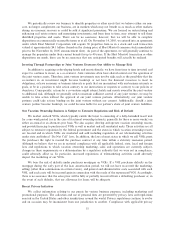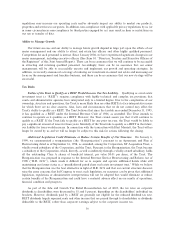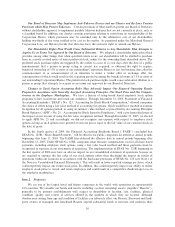Starwood 2005 Annual Report Download - page 14
Download and view the complete annual report
Please find page 14 of the 2005 Starwood annual report below. You can navigate through the pages in the report by either clicking on the pages listed below, or by using the keyword search tool below to find specific information within the annual report.Item 1A. Risk Factors.
Risks Relating to Hotel, Resort, Vacation Ownership and Residential Operations
We Are Subject to All the Operating Risks Common to the Hotel and Vacation Ownership and
Residential Industries. Operating risks common to the hotel and vacation ownership industries include:
¬changes in general economic conditions, including the prospects for improved performance in other
parts of the world;
¬impact of war and terrorist activity (including threatened terrorist activity) and heightened travel
security measures instituted in response thereto;
¬domestic and international political and geopolitical conditions;
¬travelers' fears of exposures to contagious diseases;
¬decreases in the demand for transient rooms and related lodging services, including a reduction in
business travel as a result of general economic conditions;
¬the impact of internet intermediaries on pricing and our increasing reliance on technology;
¬cyclical over-building in the hotel and vacation ownership industries;
¬restrictive changes in zoning and similar land use laws and regulations or in health, safety and
environmental laws, rules and regulations and other governmental and regulatory action;
¬changes in travel patterns;
¬changes in operating costs including, but not limited to, energy, labor costs (including the impact of
unionization), food costs, workers' compensation and health-care related costs, insurance and unantici-
pated costs such as acts of nature and their consequences;
¬disputes with owners of properties, franchisees and homeowner associations which may result in
litigation;
¬the availability of capital to allow us and potential hotel owners and franchisees to fund construction,
renovations and investments;
¬foreign exchange Öuctuations;
¬the Ñnancial condition of third-party property owners, project developers and franchisees, which may
impact our ability to recover indemnity payments that may be owed to us and their ability to fund
amounts required under development, management and franchise agreements and in most cases our
recourse is limited to the equity value said party has in the property; and
¬the Ñnancial condition of the airline industry and the impact on air travel.
We are also impacted by our relationships with owners and franchisees. Our hotel management contracts
are typically long-term arrangements, but most allow the hotel owner to replace us if certain Ñnancial or
performance criteria are not met and in certain cases, upon a sale of the property. Our ability to meet these
Ñnancial and performance criteria is subject to, among other things, the risks described in this section.
Additionally, our operating results would be adversely aÅected if we could not maintain existing management,
franchise or representation agreements or obtain new agreements on as favorable terms as the existing
agreements.
General Economic Conditions May Negatively Impact Our Results. Moderate or severe economic
downturns or adverse conditions may negatively aÅect our operations. These conditions may be widespread or
isolated to one or more geographic regions. A tightening of the labor markets in one or more geographic
regions may result in fewer and/or less qualiÑed applicants for job openings in our facilities. Higher wages,
related labor costs and the increasing cost trends in the insurance markets may negatively impact our results as
wages, related labor costs and insurance premiums increase.
10


